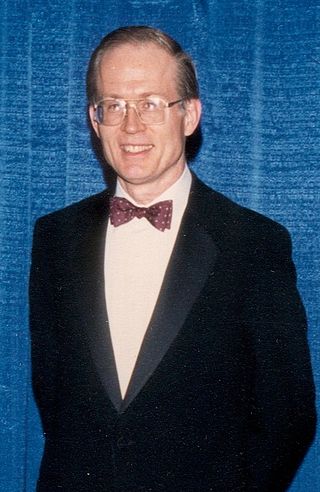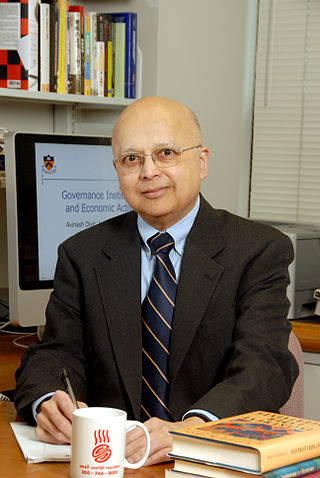Related Research Articles

Robert Cox Merton is an American economist, Nobel Memorial Prize in Economic Sciences laureate, and professor at the MIT Sloan School of Management, known for his pioneering contributions to continuous-time finance, especially the first continuous-time option pricing model, the Black–Scholes–Merton model. In 1997 Merton together with Myron Scholes were awarded the Bank of Sweden Prize in Economic Sciences in Memory of Alfred Nobel for the method to determine the value of derivatives.

Fischer Sheffey Black was an American economist, best known as one of the authors of the Black–Scholes equation. Working variously at the University of Chicago, the Massachusetts Institute of Technology, and at Goldman Sachs, Black died two years before the Nobel Memorial Prize in Economic Sciences was awarded to his collaborator Myron Scholes and former colleague Robert C. Merton for the Black-Scholes model and Merton's application of the model to a continuous-time framework. Black also made significant contributions to the capital asset pricing model and the theory of accounting, as well as more controversial contributions in monetary economics and the theory of business cycles.
Real options valuation, also often termed real options analysis, applies option valuation techniques to capital budgeting decisions. A real option itself, is the right—but not the obligation—to undertake certain business initiatives, such as deferring, abandoning, expanding, staging, or contracting a capital investment project. For example, real options valuation could examine the opportunity to invest in the expansion of a firm's factory and the alternative option to sell the factory.
The Doctor of Business Administration (DBA) or (DrBA) is a terminal degree in business administration. The DBA is classified as a research doctorate or professional doctorate depending on the granting university and country where the degree was awarded. Academically, the DBA is awarded based on advanced study, examinations, project work, and advanced research in the field of business administration.

Erik Brynjolfsson is an American academic, author and inventor. He is the Jerry Yang and Akiko Yamazaki Professor and a Senior Fellow at Stanford University where he directs the Digital Economy Lab at the Stanford Institute for Human-Centered AI, with appointments at SIEPR, the Stanford Department of Economics and the Stanford Graduate School of Business. He is also a research associate at the National Bureau of Economic Research and a best-selling author of several books. From 1990 to 2020, he was a professor at MIT.
Stewart Clay Myers is the Robert C. Merton Professor of Financial Economics at the MIT Sloan School of Management. He is notable for his work on capital structure and innovations in capital budgeting and valuation, and has had a "remarkable influence" on both the theory and practice of corporate finance. Myers, in fact, coined the term "real option". He is the co-author with Richard A. Brealey and Franklin Allen of Principles of Corporate Finance, a widely used and cited business school textbook, now in its 11th edition. He is also the author of dozens of research articles.
Sanford "Sandy" Jay Grossman is an American economist and hedge fund manager specializing in quantitative finance. Grossman’s research has spanned the analysis of information in securities markets, corporate structure, property rights, and optimal dynamic risk management. He has published widely in leading economic and business journals, including American Economic Review, Journal of Econometrics, Econometrica, and Journal of Finance. His research in macroeconomics, finance, and risk management has earned numerous awards. Grossman is currently Chairman and CEO of QFS Asset Management, an affiliate of which he founded in 1988. QFS Asset Management shut down its sole remaining hedge fund in January 2014.

Avinash Kamalakar Dixit is an Indian-American economist. He is the John J. F. Sherrerd '52 University Professor of Economics Emeritus at Princeton University, and has been distinguished adjunct professor of economics at Lingnan University, senior research fellow at Nuffield College, Oxford and Sanjaya Lall Senior Visiting Research Fellow at Green Templeton College, Oxford.

Sir Christopher Antoniou Pissarides is a Cypriot economist. He is Regius Professor of Economics at the London School of Economics, and Professor of European Studies at the University of Cyprus. His research focuses on macroeconomics, labour economics, economic growth, and economic policy. In 2010 he received the Nobel Prize in Economics along with Peter Diamond and Dale Mortensen, "for their analysis of markets with theory of search frictions."
Constantinos C. Markides is a Cypriot management educator and, since 1990, the Robert P. Bauman Professor of Strategic Leadership at London Business School. He is known for his work on strategic disruption and business models which is particularly illustrated in his book Game Changing Strategies published in 2008. He was listed among the Forbes.com list of Most Influential Management Gurus (2009).
Michael E. Raynor is a Canadian writer and an expert on business management practices.

Jørgen Randers is a Norwegian academic, professor emeritus of climate strategy at the BI Norwegian Business School, and practitioner in the field of future studies. His professional field encompasses model-based future studies, scenario analysis, system dynamics, sustainability, climate, energy and ecological economics. He is also a full member of the Club of Rome, a company director, a member of various not-for-profit boards, a business consultant on global sustainability matters and an author. His publications include the seminal work The Limits to Growth (co-author), and Reinventing Prosperity. He served, between 1994 and 1999, as deputy director general of the World Wildlife Fund International.

Yasheng Huang is an American professor in international management at the MIT Sloan School of Management, where he founded and heads the China Lab and India Lab. His research areas include human capital formation in China and India.

Andrew Wen-Chuan Lo is a Hong Kong-born Taiwanese-American economist and academic who is the Charles E. and Susan T. Harris Professor of Finance at the MIT Sloan School of Management. Lo is the author of many academic articles in finance and financial economics. He founded AlphaSimplex Group in 1999 and served as chairman and chief investment strategist until 2018 when he transitioned to his current role as chairman emeritus and senior advisor.
Eduardo Saul Schwartz is a professor of finance at SFU's Beedie School of Business, where he holds the Ryan Beedie Chair in Finance. He is also a Distinguished Research Professor at the University of California, Los Angeles. He is known for pioneering research in several areas of finance, particularly derivatives. His major contributions include: the real options method of pricing investments under uncertainty; the Longstaff–Schwartz model - a multi-factor short-rate model; the Longstaff-Schwartz method for valuing American options by Monte Carlo Simulation; the use of Finite difference methods for option pricing.
Michael J. Brennan is emeritus professor of finance at the UCLA Anderson School of Management. Brennan co-designed the Brennan-Schwartz interest rate model and was a pioneer of real options theory. His writings on real options and asset pricing, corporate finance, derivative securities, market microstructure, the role of information in capital markets, and risk management have been published extensively.
David B. Yoffie is the Max and Doris Starr Professor of International Business Administration at Harvard Business School (HBS).

Huw David Dixon is a British economist. He has been a professor at Cardiff Business School since 2006, having previously been Head of Economics at the University of York (2003–2006) after being a professor of economics there (1992–2003), and the University of Swansea (1991–1992), a Reader at Essex University (1987–1991) and a lecturer at Birkbeck College 1983–1987.
Robert Stephen Pindyck is an American economist, Bank of Tokyo-Mitsubishi Professor of Economics and Finance at Sloan School of Management at Massachusetts Institute of Technology. He is also a research associate with the National Bureau of Economic Research and a Fellow of the Econometric Society. He has also been a visiting professor at Tel-Aviv University, Harvard University, and Columbia University.
Julian Birkinshaw is a British academic. He is Professor of Strategy and Entrepreneurship at the London Business School, where he is the Academic Director of the Deloitte Institute of Innovation and Entrepreneurship. He is the author of four books on management. In February 2024 he was appointed the Dean of Ivey Business School at Western University. He assumed the position on 1 August 2024.
References
- ↑ www.ucy.ac.cy
- ↑ www.jstor.org
- ↑ www.jstor.org
- ↑ Real Options: Managerial Flexibility and Strategy in Resource Allocation Archived 2011-06-29 at the Wayback Machine
- ↑ "Lenos Trigeorgis". Durham University Business School. Retrieved 2025-01-16.